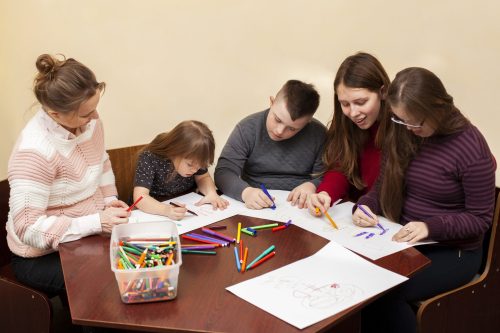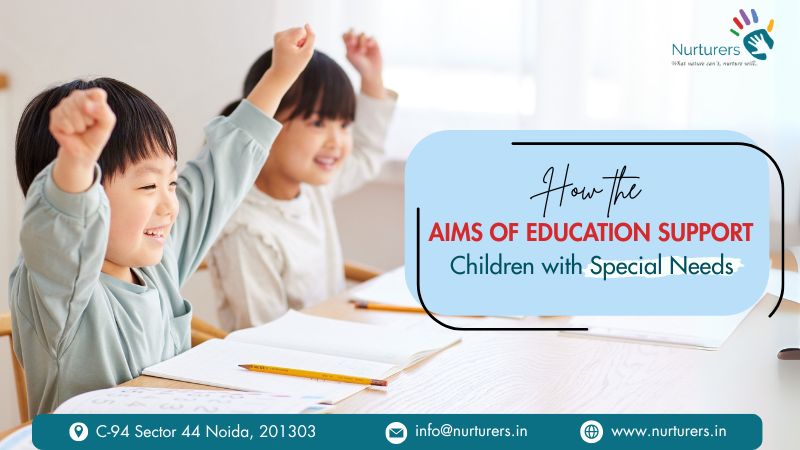The true aims of education extend far beyond textbooks and classroom assessments. They are rooted in the development of the whole child—emotionally, socially, physically, and intellectually. For children with special needs, these aims become even more significant, as education serves not just as a path to knowledge, but as a critical tool for empowerment, inclusion, and independence. One of the core aims of education is to foster equal opportunities for every learner, regardless of their abilities. This means adapting teaching methods, materials, and environments to meet the unique needs of each child. Through individualized education plans (IEPs), specialized therapies, and inclusive classrooms, children with special needs can access learning that is both meaningful and achievable.
Education also plays a vital role in enhancing a child’s self-esteem and social development. Special education strategies focus on building communication skills, emotional regulation, problem-solving, and teamwork—skills that are essential for integration into society. The ultimate aim is to help each child develop the confidence and ability to participate actively in their communities.
What Is the Aim of Education?
At its core, education is meant to empower individuals—not just academically, but emotionally, socially, and morally. It serves as a lifelong tool that helps individuals grow into responsible, independent, and self-aware members of society. Traditionally, the aims of education include:
- Imparting academic knowledge and critical thinking
Education builds foundational skills in literacy, numeracy, science, and reasoning. It helps learners process information, solve problems, and make informed decisions in everyday life. - Encouraging ethical values and character development
A key aim of education is to instill honesty, empathy, responsibility, and respect for others—traits essential for building a just and compassionate society. - Fostering emotional intelligence and self-awareness
Children learn how to recognize their feelings, regulate emotions, and build healthy relationships, which are just as important as academic achievement. - Nurturing creativity, curiosity, and innovation
By encouraging exploration and imagination, education fuels lifelong learning and personal fulfillment beyond textbooks and classrooms. - Promoting social participation and community engagement
Schools teach collaboration, teamwork, and civic responsibility—skills that enable individuals to contribute meaningfully to their communities.
But when applied to children with special needs, these goals require adaptation. Educational systems must become more inclusive, accessible, and personalized to meet each child’s unique capabilities and learning styles.

Expanded Aims of Education for Special Needs Children
While the general aims of education are centered around intellectual growth, moral values, and social development, children with special needs require these goals to be more specific, flexible, and individualized. Their learning journey is often non-linear and deeply personal, shaped by unique abilities, challenges, and developmental patterns.
1. Personalization of Learning
Children with special needs often learn differently from their peers. They may struggle with attention, communication, or sensory processing. The educational system must move beyond standard curriculums and focus on Individualized Education Plans (IEPs) or Individualized Learning Programs (ILPs).
These customized plans:
- Set personalized academic and developmental goals
- Include therapy services like speech, occupational, or behavior therapy
- Use adaptive tools such as visual schedules, sensory breaks, or assistive technologies
By addressing a child’s specific learning style, education becomes more effective and enjoyable for them.
2. Enhancing Functional Life Skills
A fundamental aim of education—especially for children with developmental disabilities—is teaching real-life functional skills. These include:
- Communication and social interaction
- Personal hygiene and self-care
- Time management and organization
- Basic money handling and safety skills
Functional learning builds independence and self-reliance, helping children feel capable in everyday environments at home, school, and beyond.
3. Building Emotional Resilience
Many children with special needs face emotional challenges like anxiety, frustration, or low self-esteem due to repeated failures, bullying, or lack of understanding. One of the most overlooked yet essential aims of education is to foster emotional resilience and psychological strength.
This includes:
- Providing a safe, accepting learning environment
- Teaching emotional regulation through storytelling, roleplay, and therapy
- Promoting positive behavior support strategies
- Encouraging consistent praise and reward systems to build confidence
An emotionally supported child is more likely to develop social skills and engage meaningfully with others.
4. Strengthening Communication and Expression
Children with speech delays, autism spectrum disorders, or intellectual disabilities often struggle to express themselves. Education should support alternative modes of communication, such as:
- Augmentative and Alternative Communication (AAC) devices
- Sign language and picture exchange systems (PECS)
- One-on-one speech and language therapy
- Play-based and interactive language development methods
Helping children communicate effectively is central to helping them form relationships, express needs, and participate in learning.
5. Encouraging Peer Interaction and Inclusion
Education is also about community and social connection. Inclusive classrooms where children of all abilities learn together provide opportunities for:
- Peer modeling of behavior and language
- Developing empathy and acceptance
- Creating a sense of belonging
- Preventing social isolation
These interactions help children with special needs learn cooperation, sharing, and social communication—skills essential for lifelong participation in society.
6. Recognizing Multiple Intelligences
Not all intelligence is academic. Children with special needs may show exceptional talents in art, music, memory, mechanical skills, or visual-spatial awareness. The aim of education should be to:
- Discover and nurture a child’s hidden potential
- Offer opportunities for creative expression and alternative assessments
- Celebrate diverse abilities and different forms of success
A well-rounded education promotes self-expression and self-worth, making learning a joyful process rather than a burden.
7. Empowering Families and Caregivers
Supporting children with special needs requires active collaboration with families. Educational aims should also include:
- Regular parent-teacher meetings and feedback loops
- Home-based learning support plans
- Family counseling or support groups
- Awareness programs to educate parents about rights and resources
When parents and educators work together, children receive consistent care, encouragement, and motivation across all environments.
8. Transition Planning for Adulthood
The ultimate aim of education is to prepare every child for a fulfilling life. For children with special needs, this includes planning early for transitions into adulthood—whether that means vocational training, college, or supported employment.
Schools must:
- Teach practical skills for work and daily living
- Provide career counseling and exposure to different job options
- Connect families with transition services and community programs
This ensures that children grow up with a vision of independence, productivity, and dignity.

Conclusion
The aims of education are not merely about academic instruction—they are about creating a supportive, inclusive, and empowering environment where every child, regardless of ability, can thrive. For children with special needs, education becomes a transformative force that helps them overcome challenges, build essential life skills, and gain confidence in their abilities.
By focusing on personalized learning approaches, emotional development, social interaction, and functional independence, the aims of education ensure that each child is given the tools they need to reach their fullest potential. These aims recognize that every child learns differently, and they emphasize compassion, patience, and innovation in the teaching process.

